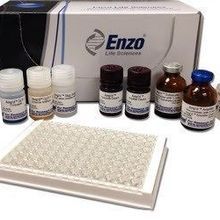Strengthening our leadership position in immunoassays, Enzo Life Sciences now offers Amp'd™ GLP-1 ELISA Kit – a rapid ELISA for the detection of the active form of Glucagon-Like Peptide 1.
GLP-1 functions in the regulation of blood glucose through insulin, and plays a role in obesity and diabetes. It is the most potent promoter of insulin secretion and an important gastrointestinal peptide hormone, or incretin. In response to eating, increased levels of GLP-1 stimulate insulin secretion and inhibit glucagon release leading to lower blood glucose levels. These positive effects of GLP-1 on glucose regulation make it an important target for the management of type 2 diabetes and the study of obesity.
The Amp'd™ GLP-1 ELISA Kit can be used to quantify the active form of human GLP-1 in serum and plasma samples. This sensitive assay is fully quantitative, with the ability to detect as low as 5.5 pg/ml of Glucagon-like...
With this new kit, Enzo Life Sciences extends our line of sensitive Amp’d ELISA kits, which includes the Amp’d HSP70 High Sensitivity Kit. Amp’d ELISA kits employ a novel signal enhancing step to amplify low signal for increased sensitivity.
About Enzo Life Sciences
Enzo Life Sciences, Inc. is a wholly owned subsidiary of Enzo Biochem, Inc. headquartered in Farmingdale, New York. The company is focused on providing innovative life science research reagents worldwide based on over 30 years of successful experience in building strong international market recognition, implementing outstanding operational capabilities, and establishing a state-of-the-art electronic information and ordering marketplace.
Enzo Life Sciences, Inc. is a recognized leader in labelling and detection technologies across research and diagnostic markets. Our strong portfolio of assay kits, libraries, proteins, antibodies, peptides, and small molecules provides life science researchers tools for target identification/validation, drug discovery, cellular analysis, high content analysis, gene expression analysis, nucleic acid detection, and protein biochemistry and detection.
Interested in reading more?




